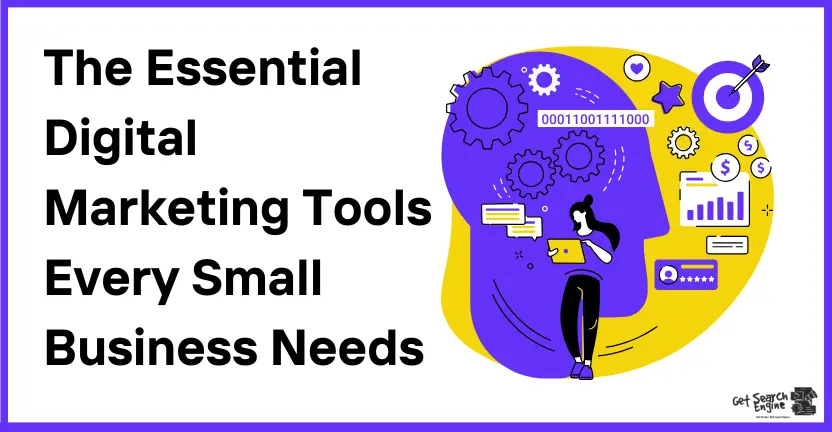Disclaimer: The reviews and comparisons in this article reflect our independent professional opinions and are provided for informational purposes only. We have aimed to remain objective and unbiased. Nothing here is intended to disparage or defame any company or product. Readers should conduct their own due diligence and verify details via official sources.
Most teams don’t fail because they lack strategy. They fail because of tool chaos. Too many platforms, overlapping features, and no clear workflow for turning data into decisions. That’s why a curated stack of the best digital marketing tools matters more than ever.
In this guide, we’ll compare leading platforms used for SEO, competitor research, and performance measurement, without getting lost in feature lists. Think of it as a practical tool for digital marketing breakdown: what each tool is strong at, who it fits best, and how to shortlist options based on your real needs.
You’ll also get a cleaner way to think about building your own digital marketing tools list, so you can spend less time switching tabs and more time improving rankings, uncovering competitor opportunities, and proving what’s working with reliable reporting. The goal isn’t to collect tools. It’s to build a workflow you’ll actually use.
What to Look For in Essential Digital Marketing Tools
“Essential” doesn’t mean popular. It means the tool consistently improves decisions, saves time, and supports a workflow you can repeat every week. The most effective digital marketing tools reduce uncertainty: they help you spot opportunities faster, prioritize the right work, and measure outcomes without guessing.
Before you pick a stack, evaluate tools using a few practical filters. This is where digital marketing tools and techniques become real, because you’re not buying features, you’re buying a process.
- Data depth: Does it answer the questions you actually ask (keywords, competitors, content gaps, backlinks, or traffic trends)?
- Workflow fit: Is it built for one person, a small team, or a tool for a digital marketing agency setup with multiple clients and reporting needs?
- Reporting clarity: Can you export insights, explain them to stakeholders, and connect them to actions?
- Learning curve: Will your team use it daily, or does it require heavy training to get value?
- Pricing flexibility: Can you start small, upgrade when needed, and avoid paying for unused capability?
The real test is simple: when you add the tool, what changes in your weekly routine, and how quickly does it translate into better work?
How We Compare the Best Digital Marketing Tools
Comparing tools is only useful if the method matches how teams actually work. So instead of ranking platforms by “most features,” we compare them by whether they make a marketing workflow clearer, faster, and easier to repeat. That’s how you end up with the best digital marketing tools that fit your goals, not just tools that look impressive in a demo.
Here’s the lens we use:
- Best for (use-case): What kind of work does the tool support best, SEO research, competitive insights, audits, reporting, or multi-client management?
- Data quality signals: Does the platform provide consistent indicators you can trust for decision-making (trend direction, relative comparisons, reliable diagnostics)?
- Ease of finding insights: How quickly can you go from question → insight → next action without digging through five menus?
- Reporting + exports: Can you package findings into client-ready or stakeholder-friendly outputs? This matters even more when you’re tracking digital marketing measurement tools week to week.
- Support and training ecosystem: Documentation, education, templates, communities, and onboarding resources, especially important for teams scaling usage.
One note on tone: there’s no “perfect” platform. A tool may suit teams that need speed and simplicity, while another is a strong fit for deeper research. The goal is best-fit selection, not hype-driven buying.
The 12 Tools Worth Shortlisting
These SEO tools for digital marketing are widely used for research and competitive insights. Don’t pick the most popular; pick what fits your workflow.
Ahrefs
Pros
- Strong workflows for link and competitor discovery that speed up planning.
- Clear authority indicators like Ahrefs domain rating for quick triage.
- Research is fast with Ahrefs keyword explorer plus SERP context.
Cons
- Ahrefs pricing may suit teams that prioritize deeper research over light monitoring.
- Some workflows feel best when you standardize internal processes.
Best For / USP: Best for teams that live in backlinks and content opportunities, anchored by Ahrefs backlink checker and Ahrefs traffic checker.
Our View: Ahrefs is a strong fit when you want decisive research signals and repeatable competitor routines.
Q: How to conduct keyword research in Ahrefs?
Q: Is Ahrefs worth it?
SEMrush
Pros
- Broad suite for planning, audits, and content workflows in one place.
- Competitive workflows are easily operationalized with SEMrush’s competitor analysis.
- Training resources help teams onboard faster via SEMrush Academy.
Cons
- SEMrush pricing fits best when multiple features are used consistently.
- Best results come from setting up saved workflows and templates.
Best For / USP: Best when your workflow needs structured research at scale, powered by the SEMrush keyword magic tool and SEMrush keyword research.
Our View: SEMrush is a strong fit for teams that want one platform to guide weekly priorities.
Q: How accurate is SEMrush?
Q: Is SEMrush worth it?
SE Ranking
Pros
- Balanced platform that supports daily SEO workflows without feeling heavy.
- Content workflows are easier to operationalize using the SE Ranking content editor.
- Accessible training and onboarding through SE Ranking e-learning.
Cons
- SE Ranking pricing is best aligned when you know your reporting cadence.
- Some teams prefer deeper specialization depending on their niche.
Best For / USP: Best for teams wanting an all around SE Ranking SEO tool with monitoring and workflow clarity, including the SE Ranking backlink checker.
Our View: SE Ranking is a strong fit for teams that want consistent execution over complexity.
Q: Is SE Ranking legit?
Q: How to do keyword research with SE Ranking?
Moz
Pros
- Clean, approachable workflows that help teams build SEO habits.
- Useful browser insights through the Moz Pro extension for quick checks.
- Straightforward onboarding when using Moz Pro consistently.
Cons
- Moz Pro pricing is easiest to justify when reporting and audits are used weekly.
- Some teams pair it with another tool for additional competitive depth.
Best For / USP: Best for teams who want a steady, readable platform with Moz Pro trial onboarding and clear workflows.
Our View: Moz is a strong fit when you want clarity, consistency, and a platform your team will actually use.
Q: How to get Moz Pro for free?
Q: Is Moz Pro worth it?
Serpstat
Pros
- Practical suite for keyword discovery, audits, and competitor exploration.
- Quick benchmarking is easier with the Serpstat website traffic checker.
- Straightforward setup for testing ideas and expanding topics.
Cons
- Serpstat pricing is easiest to maximize when you formalize a repeatable workflow.
- Some teams use it alongside other tools for a broader market context.
Best For / USP: Best for teams that want a single platform feel with Serpstat domain rank and discovery workflows.
Our View: Serpstat is a strong fit for marketers who value fast exploration and steady execution.
Q: What is Serpstat?
Q: How to use Serpstat?
Similarweb
Pros
- Strong market and channel context for competitive research decisions.
- Fast insights with Similarweb insights when you need directional trends.
- Useful browser workflows with the Similarweb extension for quick checks.
Cons
- Similarweb pricing may suit teams that rely on market-level visibility regularly.
- Best used when you compare trends over time, not single data points.
Best For / USP: Best for teams doing Similarweb competitor analysis and channel benchmarking across categories.
Our View: Similarweb is a strong fit when you need market context to guide where you compete.
Q: What is the traffic share in Similarweb?
Q: Is Similarweb accurate?
SpyFu
Pros
- Built for competitive visibility, especially around ads and keyword overlap.
- Easy to turn SpyFu reviews style research into shortlist decisions.
- Useful planning workflows anchored by SpyFu keyword research.
Cons
- Best fit when your strategy includes competitor-led planning and iteration.
- Some teams complement it with deeper technical auditing tools.
Best For / USP: Best for competitive workflows that connect SpyFu SEO audit insights with rival keyword and ad signals.
Our View: SpyFu is a strong fit when your edge comes from learning what competitors consistently run.
Q: Is Moz or SpyFu better for keyword planning?
Q: How accurate is SpyFu?
Mangools
Pros
- Friendly workflows that make research feel faster and more approachable.
- Quick wins for content planning using Mangools kwfinder.
- Great for teams who want clarity without heavy setup.
Cons
- Mangools pricing fits best when you consistently use a tight weekly workflow.
- Some advanced teams pair it with deeper crawlers for broader audits.
Best For / USP: Best for creators and small teams who want lightweight research with Mangools keyword research and practical Mangools SEO routines.
Our View: A strong fit when your goal is steady publishing and simple, repeatable decision making, especially if you like a clean Mangools review style experience.
Q: How to use Mangools?
Q: Is Mangools legit?
Sistrix
Pros
- Visibility-focused insights that help teams track market movement over time.
- The modular approach through the Sistrix toolbox supports focused workflows.
- Useful for teams managing multiple competitors and long-term tracking.
Cons
- Best fit when visibility tracking is a weekly habit, not occasional research.
- Some teams pair it with other tools for deeper link and audit workflows.
Best For / USP: Best for visibility tracking and competitive monitoring, with research breadth across Sistrix SEO and international contexts like Sistrix keyword recherche.
Our View: Sistrix is a strong fit when you want a durable, trend-based lens on performance.
Q: What is Sistrix?
Q: How does Sistrix work?
SEO Powersuite
Pros
- A desktop-based workflow that supports deep control over audits and reporting.
- Useful tracking routines with the SEO Powersuite rank tracker.
- Flexible exports when you need deliverables for clients or stakeholders.
Cons
- Best fit when you’re comfortable managing projects locally and staying organized.
- Some teams prefer cloud tools for collaboration, depending on workflow needs.
Best For / USP: Best for teams who want structured tooling across SEO Powersuite keyword research, audits, and exports, with SEO Powersuite price often aligning to long term usage.
Our View: SEO Powersuite is a strong fit when you want control, repeatable reports, and a clear operational routine, especially if you like a “suite” approach and a practical SEO Powersuite review style workflow.
Q: Will SEO Powersuite run reports?
Q: How to use SEO Powersuite?
SEObility
Pros
- Fast audits that help teams spot issues and prioritize cleanup work.
- Simple workflows powered by SEObility SEO checker.
- Easy monitoring and checks for ongoing improvement routines.
Cons
- Best fit when you want consistent audits and actionable fixes over deep research.
- Some teams pair it with a keyword-focused platform for planning depth.
Best For / USP: Best for teams that want routine site hygiene plus monitoring, including SEObility ranking check and SEObility backlink checker workflows.
Our View: SEObility is a strong fit when your workflow is “audit, fix, verify,” and you want a tool your team can adopt quickly, especially if SEObility reviews style clarity matters.
Q: What is SEObility?
Q: Is SEObility worth it?
Search Atlas
Pros
- Designed for modern workflows that combine SEO execution with automation support.
- Helpful positioning for teams exploring Search Atlas SEO routines.
- Often evaluated for AI-assisted workflows via Search Atlas AI.
Cons
- Search Atlas pricing is easiest to assess after mapping your exact workflow needs.
- Best fit improves when you define what “success” means before setup.
Best For / USP: Best for teams that want an integrated platform approach and prefer decision support with workflows shaped by Search Atlas review-style use cases.
Our View: Search Atlas is a strong fit when you want one system to support planning, execution, and ongoing optimization, especially if you’re exploring AAI-assistedprocesses.
Q: How index definitions work in Atlas search?
Q: Is Atlas Search legit?
Which Tool Is Best for Your Workflow?
The best digital marketing tools depend less on “top features” and more on how you work day to day. Use the scenarios below as a starting point, then shortlist two tools and run the same workflow (research → plan → execute → report) before you commit.
Solo marketer: Start with a tool that makes decisions fast, keyword discovery, basic audits, and competitor cues in a simple interface. Prioritize ease of use, so you actually use it weekly.
Small business: Start with a platform that supports the basics well: keyword direction, page audits, and simple tracking. If you’re searching for the best digital marketing tools for small businesses in the USA 2025, focus on tools that keep setup light and show clear next actions.
Agency: A tool for the digital marketing agency stack should support multi-client reporting, exports, and repeatable processes. Start with a tool that makes research scalable and reporting consistent across accounts.
In-house SEO: Start with a tool built for deeper competitive research and ongoing monitoring. You’ll likely benefit from stronger backlink analysis, SERP visibility trends, and content gap workflows.
Content-led team: Start with a tool that ties keyword research to content planning, outlines, and optimization. The best fit is the one that makes writing and updating pages easier, not just finding more keywords.
No single pick fits everyone. Choose tools for digital marketing that match your workflow, then build consistency around them.
Where AI Tools Actually Help (Without Replacing Strategy)
Most AI tools for digital marketing are most useful when they shorten the “blank page” phase and speed up repetitive work. They can help you turn research into action faster: draft content briefs, generate outline options, cluster keyword lists into themes, and summarize reporting into clearer takeaways for stakeholders. Used well, the best AI tools for digital marketing don’t replace strategy; they reduce the time it takes to execute it consistently.
The guardrails matter. Treat AI output as a first draft, not a final answer. Keep a human review step for accuracy, tone, and brand voice. Verify any statistics or platform-specific claims, and make sure recommendations match your audience and offer. If you’re using the best free AI tools for digital marketing, be even more deliberate about what data you paste in and how you validate outputs, since free tiers often come with limits.
A simple rule: use AI to accelerate thinking, not to outsource judgment. When your workflows are clear, research, write, optimize, measure, AI becomes a multiplier, not a shortcut.
Build a Stack You’ll Actually Use
The best digital marketing tools aren’t the ones with the longest feature list. They’re the ones you’ll use consistently because they fit your workflow. Pick tools that help you research faster, execute more clearly, and report outcomes without friction. Then make measurement part of the routine: strong digital marketing analytics tools and reliable digital marketing measurement tools turn “we think it worked” into “we know what changed.”
Next step: Shortlist 2–3 tools, run one real campaign workflow end-to-end (research → plan → launch → report), and choose the platform that makes the work easiest to repeat.
Frequently Asked Questions
1. What are digital marketing tools?
2. How does direct mail integrate with digital marketing tools?
3. What are the most efficient and useful digital marketing tools?
4. How Digital Marketing Tools Streamline Email Marketing?
5. How to choose a tool for forecasting digital marketing budgets?





